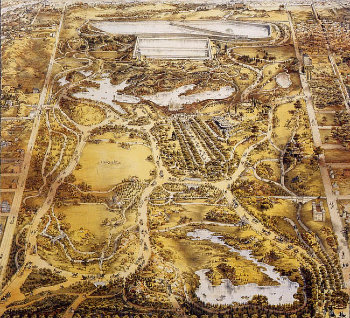Stewardship
...as the Olentangy area grows, and more join in building this commUNITY, the concept of stewardship takes on greater importance.

Every year I give my students the task of leaving us with their final words and I do the same assignment myself.
2024 FINAL WORDS: Stewardship
When I started at OLSD in 1999, we had only 6 school buildings. We now have 28. When I moved here from Youngstown, I knew only 4 people in Columbus, and now I have layers of community I have built, like bricks in a home—my home. I drive down my street, and I see my students in their yards playing with siblings, I see parents of students walking their dogs, and grandparents of students tending their gardens. I finally, even, have a former student as a neighbor—she and her husband and their sweet beagle live just around the corner. This, above all, made me feel the most accomplished; when I first saw her pulling out of her driveway, I was actually, physically struck with absolute joy and just had to hug her! Someone grew up here, chose to stay here…chose to keep building this community, oddly centered on not a town or established municipality, but a school district: our #oneolentangy.
Central Park in 1898 and recently. What does “good stewardship” of the land mean?

Delaware county residents see OLSD as either a bane or a boon. A bane to their sparse, simple, farming-and-country way-of-life. A boon to the suburban blend of cultures, increased commerce, and that center-point of academic studies for our children. So many may also say, “We are moving out as soon as my kid graduates!” I remember having to drive to Arrowhead Elementary in 1999 to grab some cheerleading uniforms for my and my new friend Katie's cheer squads, and thinking: man, this school is way out in the sticks! Who the heck would live way out here? There’s no grocery store or gas station… And a mere 7 years later, my back yard ran right into the school’s playground—perhaps intentionally ironically. 🙂
Many of us are here without our extended families. We can’t head to grandma’s for dinner on a Tuesday night because she is miles, or whole continents, away. Some of us have sacrificed that unity for other things—an opportunity cost. Like our American history books tell us, there were people from the dawn of time who left their villages or countries to construct new ones. And as the Olentangy area grows, and more join in building this commUNITY, the concept of stewardship takes on greater importance. Our Berlin, newest of the high schools, has this responsibility, too, to humbly and bravely recognize its foundations. At the ribbon-cutting ceremony, Mr. Spinner was so intentional to honor the woman, Bonnie Cozze, who donated the land to our purpose.
Coming from Youngstown, founded in 1797, I grew up embracing the myriad, strong ethnic enclaves that brought us food, dance, and traditions helping us know who we were. When those enclaves began to blend into each other and neighborhoods of immigrants found original boundaries more permeable, my ancestors grew stronger by being less siloed in their identities.
This area is very different from that. Our neighborhoods formed over farmland lack attention to centuries of curated and maintained culture—those living here now are designing a new culture, like my people did in northeast Ohio in the early 1800s. And as the first pioneers to any new land, we have obligations to those living, and those to come: leadership and legacy have to be top of mind in all the decisions we make. We have to, above all, take care to take care. Those who cannot trace their families in the greater Olentangy watershed 4-5 generations back can learn so much from immigrant practices and patterns—for they are that to this area. All of America, in fact, is the same, right? Our growing Olentangy community is like a fractal replicating that original pattern. (see US Census Information)
For generations, pioneering Americans have asked such valuable questions in shaping this new world: What does being a good neighbor look like? What good do I bring to those around me: how am I contributing to the whole and what gifts can I share? Am I respectful of the shared spaces, like roads and parks; resources, like water and energy? What businesses should we invite and support—and where should they be located?
I’ve joked that the dinosaurs swam in the water on this planet. Well, they did. Is it still as pure and as fresh? The North American Natives knew so much more about plants and resources to support their families—are we doing justice to this land? I know so many people “indigenous” to Delaware City and particularly our home, southern Delaware county, worry about the overcrowding and loss of farming. I imagine in the early 1800s that conversation was repeated when this territory was settled, too. All I know is that we are in control of what this place will become. With so many daily decisions to make, we impose our values on each other and the community as a whole. What values deserve to be shared or shed? (Plastic or paper—how about neither?)
Last month I went to a baby shower for a 2011 Orange graduate. I knew her whole family, including her mom’s mom and a “future” brother-in-law (🙂 ?), also from that class. A couple weeks later, Ed and I attended a college graduation for a former student. The next generations just keep coming. And as I look at this class of sophomores, Berlin graduates of 2026, I wonder where they will settle. How wide will their diaspora be? Better, how close? (Will someone FINALLY open a coffee shop we can all WALK to? Kidding/not kidding…)
I am very intentional about where my support goes: Food trucks? Commander in Cheese. Dentist? Dr. John Folk. Optometrist? Dr. Matt Jones. Cakes? SSCupcakery. Dinner? Indian Oven. All because they are run by my students’ families and I want our community to thrive. I know my decisions impact our collective future. (I am going to create an Olentangy Families Business directory—would you like to help?)
“The Olentangy watershed is part of the Scioto River basin, which drains to the Ohio River. The Ohio River in turn flows into the Mississippi, which makes its way south to the Gulf of Mexico.” Though we may not always see them, so many pathways connect us. As the quote above reinforces, by the very land we live on, we are all a part of something larger than ourselves. When we drive on our roads, vote for our leaders, shop at our stores, talk to our neighbors, please remember our place and the power of those connections. Feel the comfort of your surroundings and make good decisions for yourself and everything else that surrounds you. Be intentional stewards. As the class of 2024 wants us to remember we are “Stronger Together”.
(Rabbit-hole: I wonder if global settling trends are similar. As of November 15, 2022, the world’s population reached 8 billion. “The UN estimated that the human population reached one billion for the first time in 1804. It was another 123 years before it reached two billion in 1927, but it took only 33 years to reach three billion in 1960.” How many people total have ever lived? See this. Can we be good stewards of the global population, too?)
